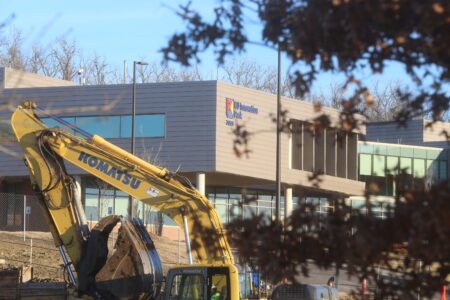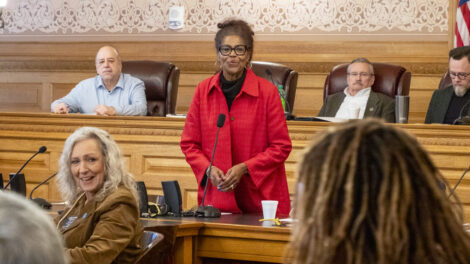Eight months and still no decision in closely watched Kansas abortion case

Kansas Supreme Court Justice Carol Beier asks questions Thursday, March 16, 2017, (Thad Allton/The Topeka Capital-Journal via AP, Pool)
Topeka ? Topeka — It has now been more than eight months since oral arguments were delivered, and the Kansas Supreme Court still has not issued its decision in a case that will determine whether the Kansas Constitution, as opposed to the federal Constitution, guarantees a woman’s right to have an abortion.
The case is being closely watched nationally because many believe the U.S. Supreme Court is poised to overturn Roe v. Wade, the landmark 1973 case that first legalized abortion nationwide.
Abortion rights advocates, including the Center for Reproductive Rights, whose attorneys argued the case before the Kansas Supreme Court in March, believe that if Roe v. Wade is overturned, it will make the legality of abortion a state-by-state policy decision.
“The physicians exercised their rights to have this court look at the scope of protection under the Kansas Constitution, and as this court noted in (an earlier) case, federal constitutional protection seems to ebb and flow with the political tide,” CRR attorney Janet Crepps said during oral arguments in March.
The case involves Drs. Herbert C. Hodes and Traci Lynn Nauser, a father-daughter team of obstetrician-gynecologists who operate the Center for Women’s Health in Overland Park.
They are challenging a first-in-the-nation 2015 law, signed by Republican Gov. Sam Brownback, that bans a commonly used procedure for second-trimester abortions that is known medically as “dilation and evacuation,” or D & E, but which is referred to by abortion opponents and the law itself as “dismemberment abortion.”
Earlier this year, the state of Texas enacted a similar law, requiring doctors to stop a fetus’ heart before performing a D & E, but a federal district judge on Wednesday overturned that law as unconstitutional, setting up a possible appeal process that could lead to the U.S. Supreme Court.
A group of conservative state lawmakers calling themselves the “Truth Caucus,” led by Sen. Ty Masterson, R-Andover, argued recently that the court should respect the Legislature’s decision.
“The Truth Caucus demands the will of the people be recognized and accepted. The Kansas Supreme Court must put these cruel and barbaric live dismemberment abortions to an end by allowing this law to take effect,” the group said in a statement emailed to news outlets earlier this month.
Normally, challenges to such a law would be filed in federal court, pursuant to a long line of decisions flowing out of Roe v. Wade that say states have only limited authority to regulate abortion prior to the third trimester, and they are not allowed to enact laws or regulations that impose an “undue burden” on a woman’s access to abortion services.
But as the U.S. Supreme Court has grown more conservative in recent years, some fear it could overturn Roe v. Wade, which would send the decision about the legality of abortion back to the states.
As a result, groups like the Center for Reproductive Rights are increasingly turning to state courts, hoping for decisions that say state constitutions provide the same privacy and due process rights that the Roe decision said form the basis behind the right to an abortion.
In June 2015, Shawnee County District Judge Larry Hendricks granted a temporary injunction blocking the new law from taking effect, pending a trial in the matter.
The state appealed that decision to the Kansas Court of Appeals, which heard the case “en banc,” meaning all 14 judges took part. And in a rare outcome, the court split 7-7 on the case in a decision that was announced in January 2016.
That set up an appeal to the Kansas Supreme Court during an election year in which five of the seven justices were up for retention. And while the court did not hear arguments in the case until March 16 of this year, four months after the election, the issue nonetheless lurked in the background amid a concerted, but ultimately unsuccessful, campaign aimed at unseating four of those five justices.






